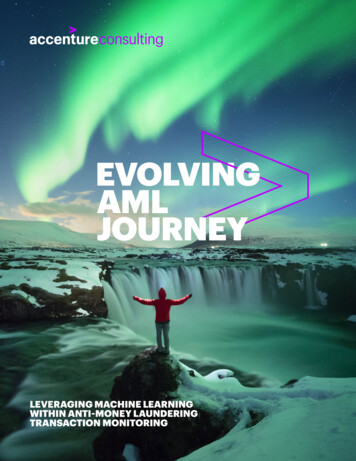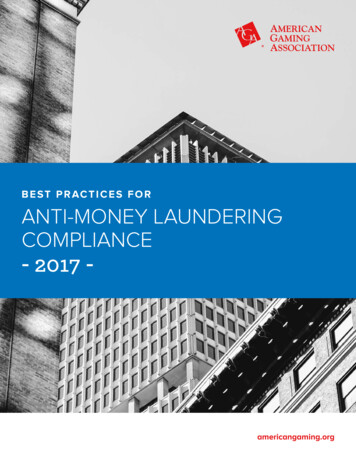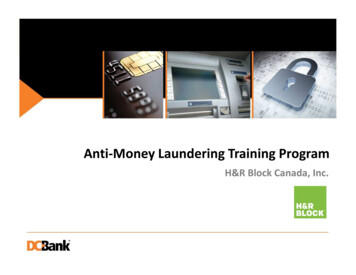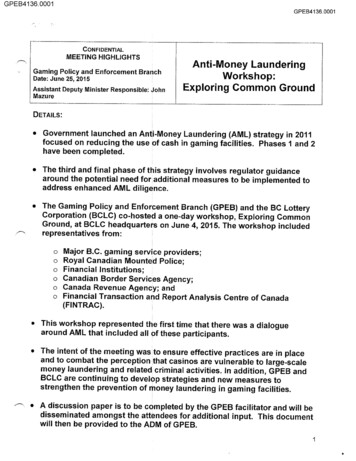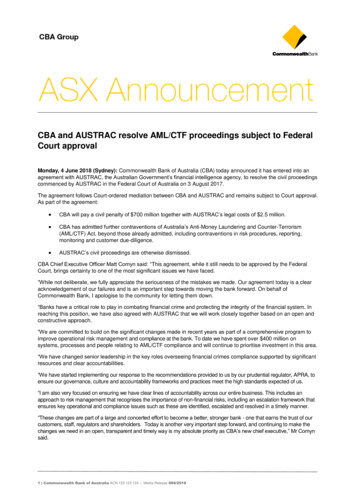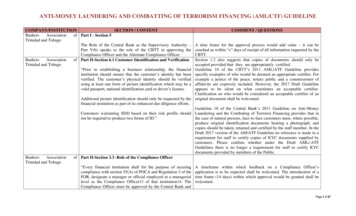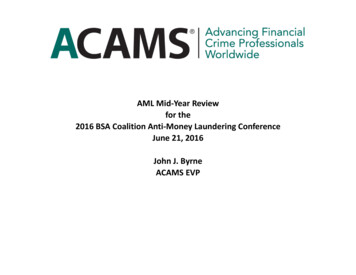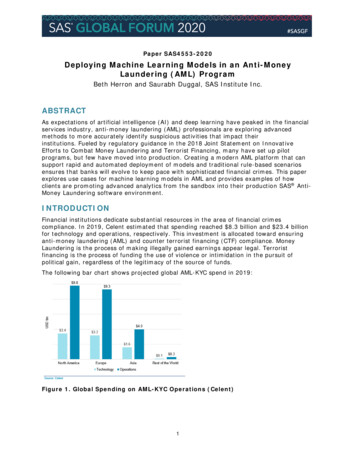
Transcription
Anti-Money Laundering (AML/KYC) PolicyWe, at Credefi Ltd. (“Credefi”, “Company”, “We”), are aware of our corporate dutyto assist in the fight against money laundering and financing of terrorism and arecommitted to high standards of Anti-Money Laundering/Counter the Financing ofTerrorism (AML/CFT) compliance.Before entering into a relationship, Credefi must have sufficient information aboutany potential client and its activities in any case where such is required pursuant tothe Anti-Money Laundering Act (AML Act). Credefi applies the "Know Your Client"principle, which forms the basis of the AML rules and includes the collection andmaintenance of client identification information. Credefi shall gather and processsuch data only for the purposes stated in this AML Policy and shall not use it for anyother purpose or disclose it to third parties unless obligated to do that by law.In its contribution to manage the risks associated with money laundering andfinancing of terrorism, Credefi has developed this internal AML/KYC Policy inaccordance with the applicable Bulgarian and European laws (Anti-MoneyLaundering Act (AML Act) and Directive (EU) 2015/849 of the EP and the Council onthe prevention of the use of the financial system for the purposes of moneylaundering or terrorist financing and Directive (EU) 2018/843 of the EuropeanParliament and of the Council of 30 May 2018 amending Directive (EU) 2015/849),and regulations as well as international standards and best practices.1. Definitions“AML” stands for Anti-Money Laundering. Money laundering is carried out through aseries or pattern of financial transactions which are intended to conceal theproceeds of criminal activities or the financing of criminal activities, or the illicitorigin of property. Money laundering is also present when the offence from whichsuch property was acquired had been committed in another member State or in athird country and does not fall under the EU jurisdiction.“AML/KYC Policy”, “Policy” – a set of internal rules and procedures that is used bythe Company in order to perform customer due diligence as per the AML Act and theDirective.“KYC” (Know Your Client/Customer) – the standards designed to protect entitiesagainst money laundering, fraud, financing of terrorism, etc. as well as to the duediligence process itself (identification, verification of identity, risk profiles, etc.).
“Credefi”, “Company”, “We” – the Company, Credefi Ltd., duly incorporated andoperating under the laws of the Republic of Bulgaria, entered into the CommercialRegister at the Registry Agency, with UIC 206396291, having its seat and address ofmanagement at: 1124 Sofia, Bulgaria, Yavorov District, 7 Boicho Voivoda Str., thatowns and maintains the Platform.“Platform”, “Website”, “Site” – the website with address (URL) www.credefi.financein addition to any sub-pages, APIs, mobile and other related software applications.“Identification” – a customer due dilligence measure that includes identifyingclients on the basis of provided identity documents.“Business Relationship” – a business, professional or commercial relationship whichis connected with the professional activities of the Company and which is expected,at the time when the contact is established, to have an element of duration.“Beneficial Owner” – any natural person(s) who ultimately owns or controls theclient and/or the natural person(s) on whose behalf a transaction or activity is beingconducted.“Politically Exposed Person” – a natural person who is or who has been entrustedwith prominent public functions (See the categories in Art. 3, point 9 of theDirective) in the Republic of Bulgaria, in another EU member State, in a third countryor in an international organisation. This AML/KYC Policy shall also apply to personsassociated with any Politically Exposed Person.“Virtual currencies”, “Cryptocurrencies” – a digital representation of value that isnot issued or guaranteed by a central bank or a public authority, is not necessarilyattached to a legal tender and does not possess a legal status of currency or money,but is accepted by persons as a means of exchange and which can be transferred,stored and traded electronically.“High-risk Countries” refer to third countries with strategic deficiencies in theirAML/CFT regime as identified by the European Commission, here.2. Objective and ScopeThe purpose of this Policy is to establish a general framework and internalprocedures of Credefi for the fight against money laundering and financingterrorism. This Policy aims at ensuring the proper identification and verification ofcustomers as well as ongoing monitoring of Business Relationships, including
transactions carried out during Business Relationships, proper verification of dataused for identification, update of relevant documents and, when necessary by law,identification of the source and origin of funds involved in transactions.Customer due diligence is the main instrument in the fight against money launderingand financing of terrorism. According to the applicable legislation, customer duediligence encompasses:(a) identifying the customer and verifying the customer's identity on the basis ofdocuments, data or information obtained from a reliable and independent source;(b) identifying the Beneficial Owner and taking reasonable measures to verify thatperson's identity so that the Company is satisfied that it knows who the BeneficialOwner is, including, as regards legal persons, trusts, companies, foundations andsimilar legal arrangements, taking reasonable measures to understand theownership and control structure of the customer;(c) assessing and, as appropriate, obtaining information on the purpose andintended nature of the Business Relationship;(d) conducting ongoing monitoring of the Business Relationship including scrutiny oftransactions undertaken throughout the course of that relationship to ensure thatthe transactions being conducted are consistent with the Company's knowledge ofthe customer, the business and risk profile, including where necessary the source offunds and ensuring that the documents, data or information held are kept up-todate.Upon qualifying of the Business Relationship via a risk-based approach in order todecide on the nature of the measure to be taken and depending on the risk (fromlow to critical – See Art. 5 of this Policy) associated with the specific BusinessRelationship, the Company applies simplified, standard or enhanced customer duediligence.3. General ProhibitionsThe Company shall not:(a) enter into Business Relationships with individuals, legal entities and groupsknown or suspected to be associated with criminal activities, to be members ofcriminal or terrorist organisations or to support politically or finance suchorganisations;(b) enter into or maintain Business Relationships or conduct transactions or dealingswith any person or entity on Lists of Sanctions or engaged in activities that directly orindirectly involve countries or territories that are subject to comprehensive
sanctions. The List of Sanctions include not only but specifically Office Of ForeignControl Sanctions (OFAC) List and OFAC Specially Designated Nationals And BlockedPersons List (SDN) list (https://sanctionssearch.ofac.treas.gov/);(c) enter into or maintain Business Relationships with individuals, entities or groupsthat are active in the military arms industry if those Business Relationships aredirectly related to the production, import, export, distribution, financing orbrokering of military weapons;(d) enter into or maintain Business Relations with legal persons or other legalentities whose activities are related to nuclear energy, with the exception of stateowned companies;(e) enter into or maintain relationships with credit institutions or financialinstitutions within the meaning of Article 3, para. 1 and 2 of Directive (EU) 2015/849or institutions carrying out activities equivalent to those carried out by suchinstitutions established in a jurisdiction in which they do not have a physicalpresence, including conception and management, and are not tied to a regulatedfinancial group that is subject to effective consolidated supervision ("PhantomBanks");(f) enter into or maintain a Business Relationship with any legal entity that does notprovide a certified copy of a license, permit or certificate of registration - if theentity's business is subject to such;(g) enter into any relationship, including opening an account, and shall not conductincidental transactions or dealings where it is not possible to meet the customer duediligence requirements. If Credefi is unable to conduct due diligence in the case of acommercial or professional relationship already established, Credefi may terminatethat relationship at its sole discretion.4. Standard due diligenceStandard due dilligence applies to all clients and persons associated with clients atthe point of entry and may apply throughout the relationship.The Company shall apply standard due dilligence:(a) when establishing a Business Relationship with a client;
(b) when carrying out an occasional transaction that amounts to EUR 15 000 ormore, whether that transaction is carried out in a single operation or in severaloperations which appear to be linked;(c) when there is a suspicion of money laundering or terrorist financing, regardless ofany derogation, exemption or threshold;(d) when there are doubts about the veracity or adequacy of previously obtainedcustomer identification data.4.1. Identification of a natural personThe Company perfoms Identification of a client who is a natural person on the basisof one of the provided identification documents (an extract in original or a notarizedcopy of), including but not limited to: a valid unexpired passport;a valid unexpired national or other government-issued identity card;a valid unexpired residence card;a valid unexpired driving license.4.2. Identification of a legal entityThe Company perfoms Identification of a client who is a legal entity on the basis ofone of the provided identification documents (an extract in original or a notarizedcopy of), including but not limited to: an extract for the current status of the legal entity from an official register;a certified copy of the Articles of Association or other official documents;a certified copy of the relevant license, permit or registration certification (ifthe client’s business is subject to such).These documents may also be used for the Identification and verification of theidentity of the Beneficial Owners. For this purpose, the Company may make furtherinquiries on the accounts of the respective legal entities in the relevant registers. Inthe event that the ownership of the capital does not indicate who the BeneficialOwner(s) is/are, a further written declaration by the legal entity’s representative isrequired.For Identification purposes (of both natural persons and legal entities), the Companymay further collect information about:
The purpose for which the account is opened or the Business Relationshipestablished;Expected transactions on client accounts;Origin of the funds expected to flow into the account;The expected destination of outgoing transfers and payments;Amount of the client's income for the last calendar year (for legal entities);Description of the client's professional activity and business;Whether or not the client meets the criteria for a high-risk client;Whether the client is a Politically Exposed Person or is related to such aperson.4.3. VerificationThe Company shall carry out verification of the identification information anddocuments by using, including but not limited to, one or more of the followingmeans: Use of technical means to verify the authenticity of the documents; Making inquiries in domestic and foreign official registers; Use of other independent sources (accessible databases of public and privateorganisations, etc.); Communication by telephone, mail or e-mail (in order to verify thecorrectness of the data provided); Request for additional documents; Request for written and/or verbal declarations, where deemed necessary inthe Company’s view.When establishing a Business Relationship or carrying out an occasional transactionby means of an electronic statement, electronic document or electronic signature, orby any other form without the presence of the client, the Company shall verify thecollected identification data by using at least two of the means referred to above.The Company may complete the verification of the identification of the client andthe Beneficial Owner at an earlier stage during the establishment of the BusinessRelationship when: 1. the identification and verification procedure leads toundermining the effectiveness and normal functionality of the respective business;2. the risk for money laundering and financing of terrorism is low and effectivemeasures for AML/CFT have been implemented.
The due diligence process is performed with the help of the Company’s standardAML/KYC Checklist accessible here.4.4. Simplified due diligenceBefore applying simplified customer due diligence measures, the Company shallascertain that the Business Relationship or the transaction presents a lower degreeof risk.Upon notifying the competent authority (the Financial Intelligence Directorate at theState Agency for National Security), the Company may perform simplified duediligence when the respective Business relationship or transaction present a low riskafter the risk evaluation (See Art. 5 of this Policy).When applying simplified due diligence measures, the Company shall ensuresufficient monitoring of transactions and Business Relationships so that it would bepossible to identify unusual transactions and detect suspicious activity.4.5. Enhanced due diligenceThe Company applies enhanced due diligence measures in order to adequatelymanage and mitigate a higher-than-usual risk of money laundering and terroristfinancing.The Company performs enhanced due diligence in relation, including but not limitedto potential or current clients or Beneficial Owners who are Politically ExposedPersons, or who are settled in High-Risk Countries, or regarding operations andtransactions which could lead to anonymity and in respect of which no additionalmeasures are envisaged under the AML Act; new products and business practices ornew technologies used thereof assessed as high-risk pursuant to Art. 5 of this Policyand the applicable laws; complex or unusually large transactions or operations, suchthat are carried out under unusual schemes as well as any other activity assessed ashigh-risk.5. Risk EvaluationWhen performing risk analysis and risk assessment of a client and/or a BusinessRelationship and/or a transaction, the Company shall take into account three riskcategories: 1. customer risk factors, 2. product, service, transaction or deliverychannel risk factors, and 3. geographical risk factors.A non-exhaustive list of risk factors includes:
type of professional activity and business;the relevant sector of this activity and/or business;the level of assets to be deposited by a customer or the size of transactionsundertaken;the regularity or duration of the business relationship;client’s reputation;whether the client is subject to international sanctions (UN,EU,OFAC, etc.);whether the client is a Politically Exposed Person;specific country and/or geographical area. In this regard, risk factors include,without limitation, whether the country applies legal provisions compatiblewith the AML/CFT international standards, whether the country is on anysanction lists (for example, in UN), whether there is a high crime rate in thecountry, etc.Risks, which are identified by the Company, may be assessed according to thelikelihood that they occur (from low to critical) and the impact of these risks on thebusiness if they occur (from low to critical). The degree of risk (risk status) varies asfollows: low, moderate, high and critical. If the risk status of a client and/or aBusiness Relationship and/or a transaction is considered high and/or critical, theCompany retains the right to not provide the services thereby.In case of any new or newly found circumstances and factors regarding the clientand/or the Business Relationship and/or the transaction, the Company may performadditional identification and verification and/or new risk assessment.5.1. Lower RiskThe following circumstances, without limitation, shall be considered as criteria oflower risk:- the customer is a company listed on a regulated market, which is subject todisclosure obligations that establish requirements for ensuring sufficienttransparency regarding the Beneficial Owner;- the customer is an entity performing public functions like publicadministrations or enterprises;- the customer is a resident in geographical areas of lower risk like MemberStates, third countries having effective AML/CFT systems, etc.5.2. Higher RiskThe following circumstances, without limitation, shall be considered as criteria ofhigher risk:- the Business Relationship is conducted in unusual circumstances;
--the customer is a resident in geographical areas of higher risk like countriesthat do not have effective AML/CFT systems, countries identified by crediblesources as having significant levels of corruption or other criminal activity,countries providing funding or support for terrorist activities, or that havedesignated terrorist organisations operating within their country, etc.the customer is a legal person or a legal arrangement, which is engaged inholding personal assets;-the customer is a company that has nominee shareholders or bearer sharesor a company whose affiliate has nominee shareholders or bearer shares;-the ownership structure of the company appears unusual or excessivelycomplex, given the nature of the company’s business., etc.6. Company’s ObligationsThe Company:(a) shall identify and verify the identification of its clients in accordance with therules set forth in Art. 3 of this Policy;(b) may be required to do a client’s economic background check (including the originof funds) if the Business Relationship and/or funds used are deemed to be unusual inthe Company’s view, or it is clear that the funds derive from any illegal activity, orthere is a high-risk factor in the Business Relationship and/or the transaction;(c) shall conduct ongoing monitoring of the Business Relationship and/ortransaction(s), including reviewing the operations and activities undertaken byclients and Beneficial Owners in the course of the relationship to assess whetherthose operations and activities are consistent with what the Company knows aboutthose clients, their business and risk profile, including, if necessary, the origin of theirfunds;(d) shall keep records of up-to-date data and documentation related to BusinessRelationships, transactions and clients’ identification documents and findings. Allinformation and documents connected to the client Identification procedure shall bemaintained in the Company’s archive for no less than 5 years as per the applicablelegislation.;(e) before processing the respective transaction, shall inform the competentauthority (the Financial Intelligence Directorate at the State Agency for NationalSecurity), including by filing a report, about the fact that the Company has sufficient
knowledge or duly suspects that any client’s funds are the proceeds of criminalactivity or are related to terrorist financing. In any such event, the Company shalldelay performing the transaction to the extent permitted by the applicable laws andregulations.7. Suspicious Activity. Termination of Business Relationships and TransactionsIn case that the Company is unable to perform initial due diligence or due diligencethroughout an already established Business Relationship, the Company may refuseto enter into or shall terminate the Business Relationship at its own discretion.In case the Company still has doubts about the authenticity of the identificationinformation and/or documents provided by the client even after carrying out arepetition of the verification of identity of the client, the Company may terminatethe Business Relationship.If a client, despite his or her obligation, does not provide the required idefntificationdocuments or in any other way refuse to cooperate, the Company shall deny therequested operation and/or transaction, or shall terminate the relationship.In the event the Company holds any assets belonging to the Client, the assets can bewithdrawn on the condition that an audit trail of the respective transactions,operations and dealings is retained so as to be presented to the competentauthorities, if legitimately requested.8. Organisational Measures and Internal ControlIn order to adequately and efficiently impelement this Policy and the underlyingapplicable laws and regulations, the Company may form AML body for AML/CFTcompliance. The AML body shall be authorized, including but not limited to, toreview this Policy, the KYC checklists as well as other internal rules and policiesrelated to AML/CFT; to manage and overview the customer due diligence; todevelop and conduct transaction monitoring systems; to prepare risk analysis andrisk assessment.9. Training ProgrammeThe Company may set up a traning program in the field of AML/CFT, in accordancewith the applicable laws and regulations, for the Company’s employees, includingmembers of the AML/CFT group, so as to provide them with proper instructions
regarding the implementation of the rules and procedures set forth in this Policy andthe prevention of money laundering and financing of terrorism.10. Governing Law and JurisdictionThis Policy and all matters arising out of or relating to it shall be governed by thesubstantive laws and regulations of the Republic of Bulgaria.In force: 22.10.2021Credefi Ltd. 2021 All rights reserved
Anti-Money Laundering (AML/KYC) Policy We, . client and/or the natural person(s) on whose behalf a transaction or activity is being conducted. "Politically Exposed Person" - a natural person who is or who has been entrusted . customers as well as ongoing monitoring of Business Relationships, including .
